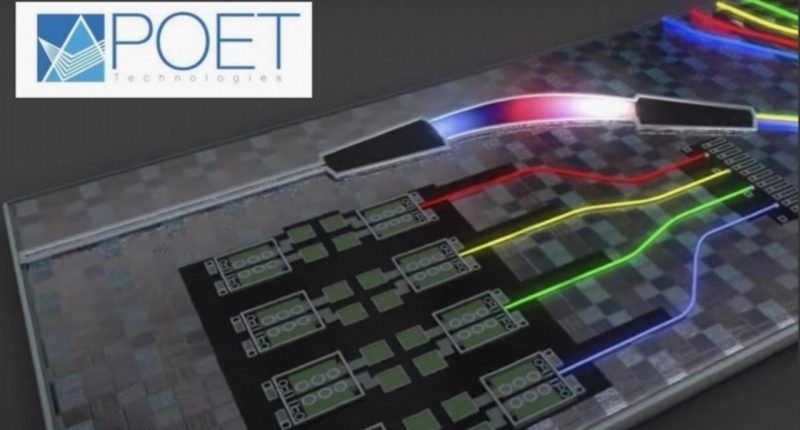The global photonics market is expected to reach $900 billion USD in 2024, an approximately 50% increase from 2018, according to a study from the European Union. Big reasons for the growth are improvements in speed and performance.
As Fortune Business Insights notes, the advantage over legacy solutions is because “silicon photonics possess the ability to transmit huge amounts of data in less time.”
That’s one explanation for why POET Technologies’ products made from its optical interposer platform are gaining industry acceptance in 2023. On January 18, POET and ADVA announced a strategic collaboration for optical engines that represent performance and cost-efficiency benefits. The small size of the integrated optical engine chiplets was the inspiration for the ADVA product. With the average size of a 100G CWDM4 and 100G LR4 optical engine chiplet being 6mm x 9mm, ADVA’s engineers saw the potential to use multiple chiplets in a single QSFP-DD pluggable form factor. The companies worked on the innovation for more than a year, with ADVA engineers requesting custom designs for their MicroMux™ Quattro product line, which POET’s teams in Allentown (Pennsylvania), Singapore, and Shenzhen (China) delivered. For example, wire bonds, which are typically on the side of an engine, were pulled to the front to accommodate other components in the tight space. Such unique engineering adjustments made it feasible for the routing to work. POET also checked with ADVA’s manufacturing unit to make sure its team could replicate that wire bond design.
The resulting pluggable transceivers are among the latest developments that demonstrate how photonics solutions are steadily impacting the data center and networking industries. ADVA said the pluggables allow its customers to have maximum flexibility, cost efficiency, and ease of use as they migrate their networks from 100G to data rates of 200G or 400G.
“POET’s unique design of its optical engines with hybrid integration of optical chips and monolithically integrated MUX and DMUX enables us to deliver industry-leading products in a small form factor that is scalable to high volume production as well as to higher data rates, such as 1.6Tbit/s and 3.2Tbit/s, thereby enabling much higher bandwidth in a pluggable form factor,” Ross Saunders, ADVA’s Vice President and General Manager of the Optical Engine business unit, said in the press release that announced the companies’ collaboration.
Under the agreement, ADVA’s MicroMuxTM product line for 4x100G CWDM4 and 4x100G LR4 will use POET’s multi-engine transmit and receive chips. The design has individual 100G ports in a QSFP-DD package that can easily plug into a 400G port. So it creates compatibility with the legacy 100G links without the need for massive retrofits in network design.
The MicroMuxTM products are specifically designed to help Internet content providers and cloud service providers develop optimum data center interconnect environments. With POET’s products, the MicroMuxTM Quattro becomes the industry’s smallest pluggable transceiver to pack four individual 100G LR4s or CWDM4s. The QSFP-DD form factor fits into standard 400G sockets and fans out 4x100GbE, maximizing the use of existing hardware in data centers.
The savings are immense for data center operators that use ADVA’s solution. The alternative solutions using a standard QSFP LR4 or CWDM4 in a QSFP-DD port lead to underutilization of available port bandwidth. The ADVA MicroMuxTM Quattro solution, enabled by POET’s optical engines, fully utilizes the bandwidth of 400G ports and breaks out into individual 100G links. The inherent investment protection provided by this solution enables phased speed migration within a data center.
The hybrid integration of lasers and photodiodes, monolithic integration of optical MUX and DMUX, and the passive alignment of components on the POET Optical InterposerTM provide a unique and differentiated solution to enable high-density network connectivity.
POET is scheduled to send beta samples to ADVA in the first quarter of 2023. What ADVA will be receiving for each LR4 product it purchases from POET is an interposer-based optical engine that has two transmit chips per optical engine and one receive chip that contains all four receivers. So, ADVA will be using three POET optical engines (two transmit and one receive) per module. POET is expected to begin production in the second half of the year, likely starting with hundreds of units per month and then ramping up to thousands of units in 2024.
ADVA’s end users will be companies in the datacom and telecom industries. According to LightCounting’s April 2022 report, the market opportunity for 100G CWDM4 and LR4 pluggable transceivers will continue to remain strong at an average of $700 million per year from 2023 to 2027.
Along with Celestial AI and other yet-to-be-named partners, ADVA is among the earliest adopters of POET’s technology. With the POET Optical InterposerTM, the industry that has struggled to find a reliable and cost-efficient solution to achieving higher speeds of data transfer can now architect 400G, 800G, 1.6Tbps and 3.2Tbps pluggable transceivers.
At OFC 2023 in March, POET plans to demonstrate a variety of products. Last year, after the company’s live demos at the conference, a notable semiconductor pioneer called the POET Optical Interposer “a work of art.” High praise for both POET and photonics as a whole.
Visit poet-technologies.com for updates and to learn more.





